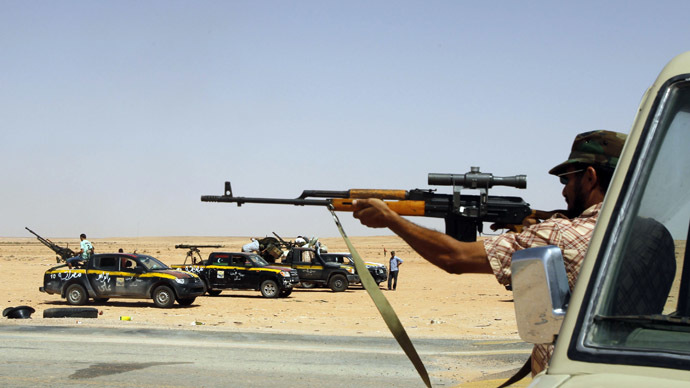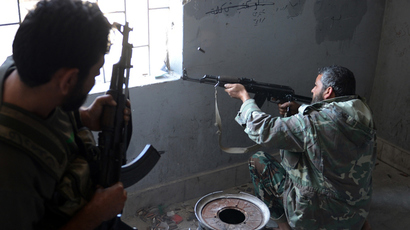Libyan separatists take over oil exports as PM warns of foreign intervention

A separatist Libyan region has announced an establishment of an independent oil company after taking over several commercial sea ports. As Tripoli struggles to regain control, the PM has warned of foreign intervention unless central govt rule is restored.
On Monday, protesters told staff at Mellitah port, in Libya's north, to cease gas exports to Italy as parliament and government had not given in to demands for wider political rights.
"We tried to convince them not to close the pipeline, but it's
closed now," head of the local oil workers' union, Munir
Abu Saud, told Reuters.
Libya’s Prime Minister Ali Zeidan said on Sunday that the demands
were intolerable. “The international community cannot tolerate
a state in the middle of the Mediterranean that is a source of
violence, terrorism and murder,” he said.
Citing the Iraq experience, he warned Libyans of a possible
“intervention of foreign occupation forces” in order to
protect civilians under Chapter VII of the UN Charter.
To avoid such a scenario, “the people must take to the
streets” and “support the building up of the army and
police,” as the government needs more time to create a
professionally trained security force, the Prime Minister said.
The Prime Minister’s warning comes as Libya slipped into a new
string of deadly attacks in Tripoli and the Eastern part of the
country over the last week.
In the latest display of lawlessness since colonel Gaddafi‘s
assassination and foreign invasion, an autonomy movement has
seized several ports and plans to sell crude oil, as Tripoli is
trying to regain the facility.
In the eastern Cyrenaica region, militias and local tribal
leaders are trying to create a loose federal system of
government, sharing power with Fezzan, the south western region
of Libya.
The prime minister of the self-proclaimed Cyrenaica government
made a live announcement on nationwide television claiming that
an oil firm has been set up in Tobruk next to the Hariga port
where the locals on Friday did refused to allow a
government-chartered tanker to load 600,000 barrels of oil bound
for Italy.
“We have formed a firm called Libya Oil and Gas Corp,”
Abd-Rabbo al Barassi told Reuters by phone. “We will wait for
a response from Tripoli and Fezzan and hope for an understanding
with them. Then the firm will sell oil and we will keep the
regional share of Tripoli and Fezzan without using it,”
Barassi said.
The creation of a separatist oil firm that will be responsible
for oil exports was undertaken alongside a plan to set up an
eastern central bank as a mix of militias and tribes seek more
autonomy.

Earlier Zeidan gave the rebels maximum of 10 days to clear the
oil facilities. “Otherwise we will take measures,” he
said.
Speaking about the chaos in Libya, the prime minister said that
the country may find it difficult to cover its budget
expenditures as oil output has dropped to a fraction of its
original of 1.25 million barrels a day.
“The budget is based on the assumption that oil revenues flow
for the [full] year,” he said. “From next or the following
month, there could be a problem covering expenditure. Due to the
oil [export] delays the state is ... facing a deficit.”
Earlier the Finance Minister said that the preparation of the
2014 budget will be delayed as the government is struggling to
collect information from an increasing number of authorities with
separate budgets.
In the meantime, protesters to the west of Tripoli have
stopped the oil exports from the Mellitah terminal and now are
threatening to stop gas exports as well, demanding more political
rights. The blockade of Mellitah which is run in cooperation by
Italy's ENI and Libya's state-owned National Oil Corp (NOC),
could force Italy to seek other markets, Zeidan said.
“Italy is now [Libya's] biggest partner. It would be a grave
matter if gas exports got blocked because they import between 23
and 25 percent of their oil needs and also import gas. If now gas
gets stopped, they might look for other sources and leave
us,” Zeidan said.
Mamdouh G. Salameh, oil consultant to World Bank warned of the gravity of the situation, telling RT: "They are not earning any revenue now at this minute from oil exports because there are no oil exports. Sooner or later Libya will stop even paying salaries to the employees, they delay the issuing of the budget because they don’t know what revenue they will be able to get and when they will be able to export oil as before."
On Thursday, Italy's Foreign Minister Emma Bonino told Republica
TV that ENI was “weighing closing wells.” When contacted by
Reuters, ENI declined to comment.
The Libyan Prime Minister has now given militias until December
31 to join the regular government forces, otherwise threatening
to cut off payments to their regional government.
“Libya is part of the world, which cares for it to be a secure
spot and not a source of nuisance,” he said. “The world will not
leave us to become a part of the Mediterranean that is a source
of terrorism, instability and violence.”















